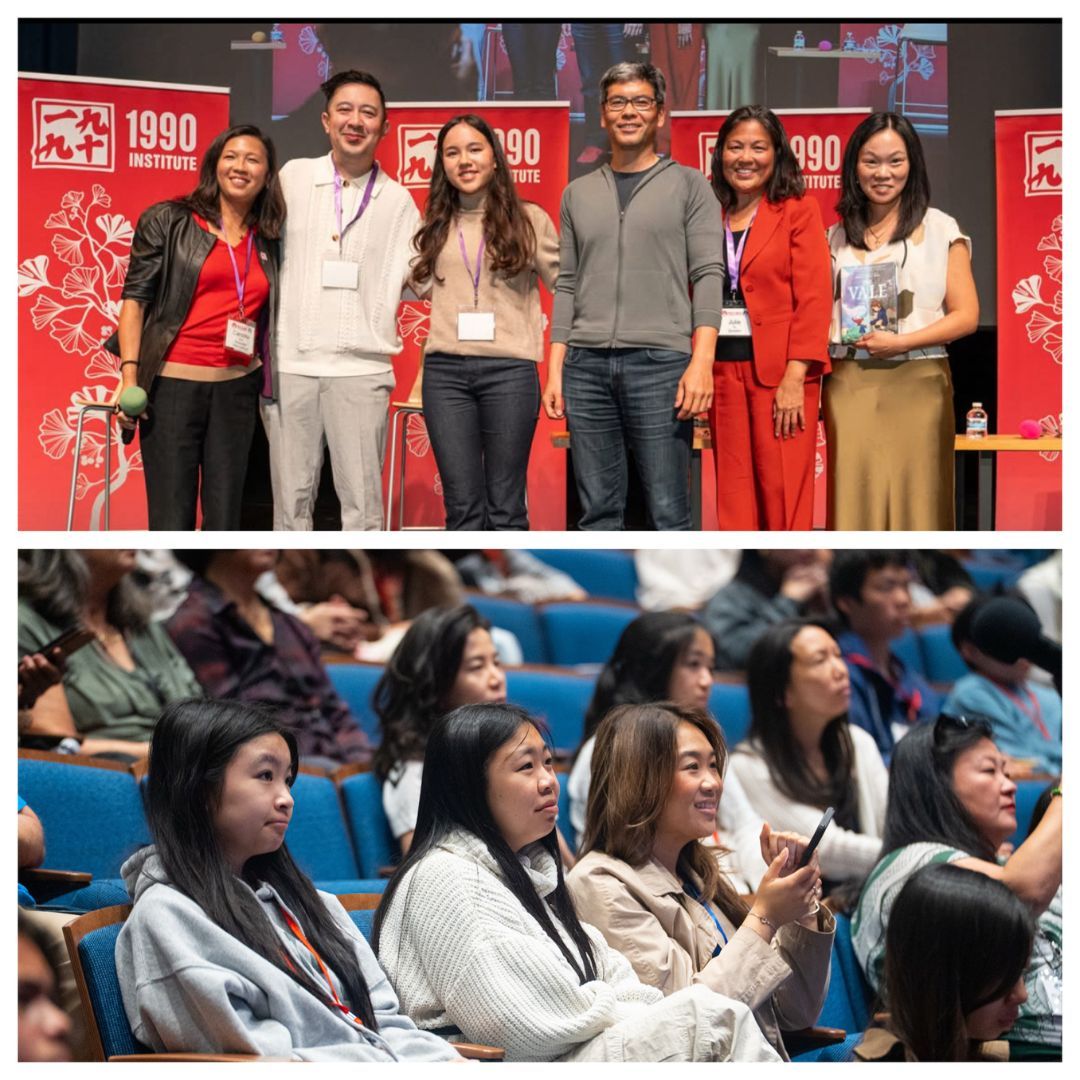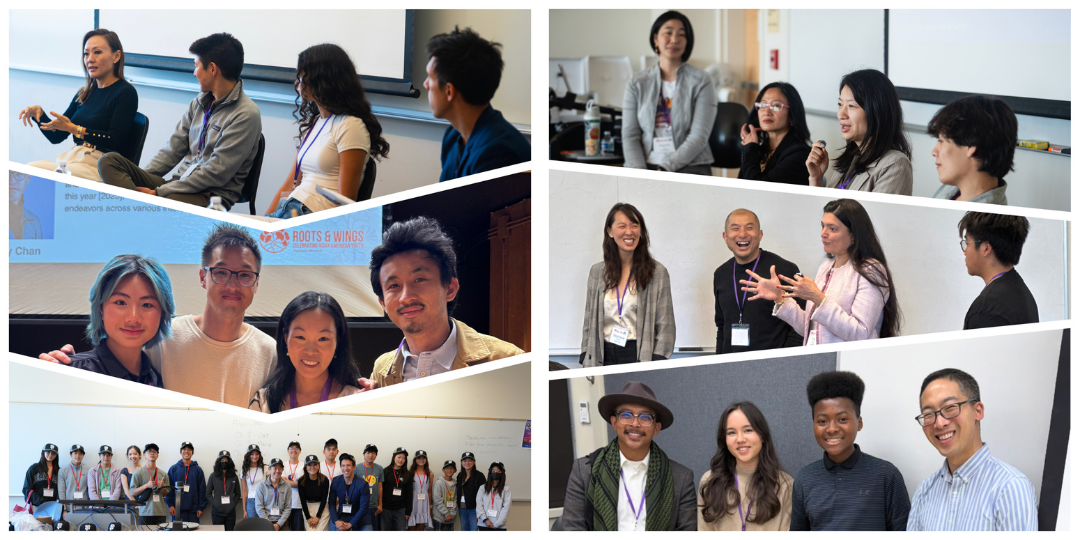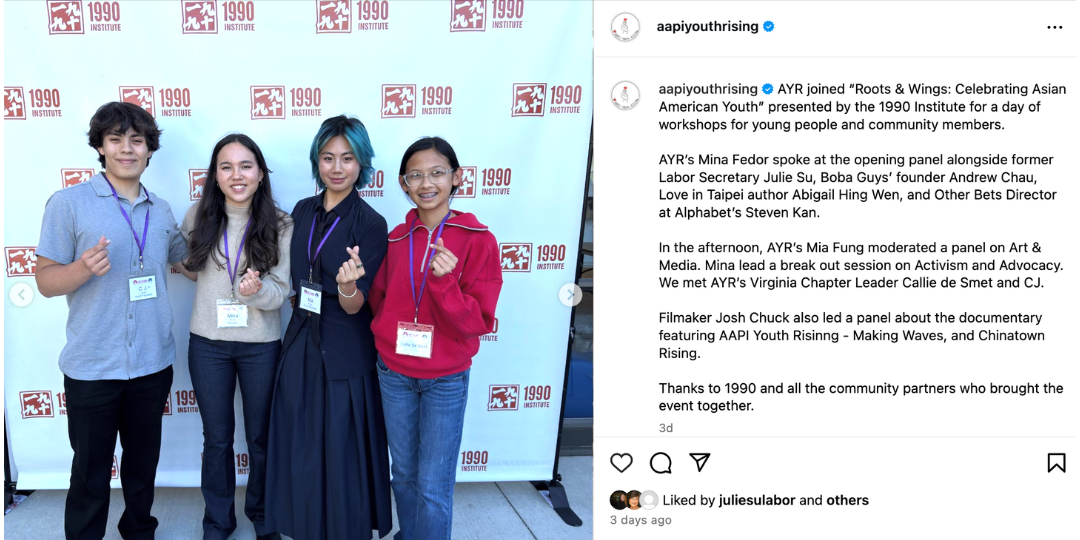| | | | Dear Friends, On Saturday September 6, 2025, the 1990 Institute presented its inaugural Youth Symposium titled “Roots & Wings: Celebrating Asian American Youth with the Power of Community” at the College of San Mateo in the San Francisco Bay Area. The event brought together over 300 youth, parents, educators, and community leaders for a day of inspiring and thought-provoking conversations, music, giveaways, fun, and empowerment. Your participation made this event unforgettable. Together, we celebrated youth voices, community, and the power of stories and following your passion. We’re grateful to all those who made this symposium a transformative event – our over 30 speakers and facilitators, our many sponsors, our 20 community partners, and the hundreds of participants of all ages. We’d like to give a special shout-out to the Cathay Bank Foundation, the Henry Luce Foundation, and The Asian American Foundation (TAAF) for their support. Boba Guys provided refreshing boba tea, and Panda Express supplied a tasty lunch for all attendees. The Asian American Education Project was our partner for two educational videos that premiered at the event. Our deep appreciation goes out to all of you for a day full of joy, connection, and learning. We will share more photos, recaps, and resources soon. If you aren’t already receiving our newsletter in your inbox, subscribe here, and pass this newsletter along to your friends and community members. Thank you for your continued support of the newsletter (see past issues here) and the 1990 Institute — your tax-deductible donation of any size supports teachers and students and programs like the Youth Symposium. |
| |  |
|
| Top, left to right: Caroline Pan, Vice Chair, 1990 Institute; Andrew Chau, Founder and CEO, Boba Guys and Tea People; Mina Fedor, Founder, AAPI Youth Rising; Steven Kan, Other Bets Director, Alphabet; Julie Su, former Acting U.S. Secretary of Labor; and Abigail Hing Wen, filmmaker and author of “Loveboat, Taipei” and “The Vale.” Top photo credit: Bob Hsiang Roots & Wings 2025 was a space where students, parents, educators, and community members could connect and learn from one another in a celebration of the importance of community. Speakers on our keynote panel shared what cultural identity means to them, what they would share with their younger selves and today’s students, and how to remain true to yourself while pursuing your dreams. |
| | China’s edge? Rare earths as bargaining chips in its trade with the U.S. By Denise Yiran Zheng, PhD
In 1987, Chinese leader Deng Xiaoping declared, “The Middle East has oil, China has rare earths.” China’s dominance in rare earths has recently given it significant leverage in trade negotiations with the U.S. As of 2024, China produces 69% of the world’s rare earth elements and controls 90% of global refining capacity. Rare earth elements are a group of 17 metals used in products from smartphones to satellites. Despite their name, they are not rare in the Earth’s crust — but they are difficult and costly to extract and separate because they are usually found in low concentrations. The United States once led rare earth production, from the mid-1960s to the 1980s, until it offshored production to China due to environmental concerns. China has established factories near rare earth mines to streamline processing, making it difficult for other countries to compete. From 2020 to 2023, the U.S. relied on China for 70% of its rare earth imports. This has created a relationship of mutual dependence: the U.S. needs rare earths for manufacturing, while China relies on the U.S. and its allies for advanced semiconductors. One of the most important uses of rare earths is in permanent magnets made from elements such as neodymium and praseodymium. These magnets power critical technologies — from wind turbines and electric vehicles to missile guidance systems and advanced radar. Because they are vital to both clean energy and modern defense, rare earths have become a strategic resource at the heart of the U.S.-China competition. In April 2025, amid escalating U.S.-China trade disputes, China introduced export controls on seven types of rare earth elements and certain magnets. These controls require special licenses, slowing shipments and disrupting supply chains. China produces about 90% of the permanent rare earth magnets, so the restrictions quickly caused shortages. Within two months, exports of these magnets fell by about 75%, forcing some automakers in Asia, Europe, and the U.S. to halt production lines. While the U.S. has tried to curb China’s artificial intelligence progress by restricting access to advanced chips, China’s rare earth export controls have pushed the U.S. back to the negotiating table. As part of a trade deal, the U.S. resumed sales of Nvidia’s downgraded H20 chip to China. The U.S. is actively seeking to diversify its trade partners and accelerate its supply chain independence. In July, the U.S. government signed a multibillion-dollar deal with MP Materials, which operates the only rare earth mine in the U.S., and the U.S. Department of Defense became its biggest shareholder. MP has since stopped sending rare earths to China for refining. As China challenges U.S. global dominance, rising tensions may lead to what political scientist Graham Allison calls the "Thucydides trap" — a situation in which war becomes likely between an established power and a rising one. To escape the trap, some Chinese thinkers cite Confucius' philosophy of “harmony without uniformity” (和而不同), while China’s President Xi Jinping has suggested that we should recognize the interdependence between the two nations: “I am in you, and you are in me.” This can be seen in U.S. efforts to resolve rare earth trade disputes by reversing visa restrictions for Chinese students. Still, China and the U.S. remain like conjoined twins where separation would be costly, but collaboration requires trust. |
| |
|
|  | Each of the five breakout sessions for youth attendees featured two speakers, one adult facilitator, as well as one youth facilitator (aged 13-17), thus providing another way for the next generation to learn and have their voices heard. |
| | |
|
| How mahjong events in San Francisco are trending with Gen Z and millennials | South China Morning Post A popular mahjong club attracts people looking to get off their phones and socialize in the real world. “It’s a really tactile game, and it’s really a social game. It really easily builds community among people, said Nicole Wong, founder of The Mahjong Project. See our short video for more on the history and popularity of the game: “Beyond the Tiles: Making Connections Through Mahjong.” Record-breaking Chinese blockbuster “Ne Zha 2” hits U.S. theaters | NPR "Ne Zha 2" has taken in more than $2.1 billion in ticket sales worldwide, breaking previous records for animated films and for non-English language films, even before it got a wider release in the U.S. with an English language dub in late August. Cleansed, toned, tariffed: How the end of the de minimis exemption is affecting Korean beauty | NBC News Online shoppers say they’re getting hit with big, surprise fees on Korean sunscreens, skin care, makeup, and more. In addition to the end of the provision that allowed packages valued at less than $800 to be imported tax-free, South Korea was subject to a 15% reciprocal tariff starting this summer. U.S. lawmakers to visit China this month | Reuters A bipartisan group of lawmakers from the U.S. House of Representatives will make an official trip to China later in September. The trip will take place during strained ties between Washington and Beijing over issues like trade tariffs, technology, cybersecurity, the ownership of TikTok, the origins of the COVID-19 pandemic, and policies related to Hong Kong and Taiwan. Kaitlyn Chen is one of the Valkyries' most popular players, but she doesn't start | KCRA "There are a lot of Asian Americans in the Bay Area and there aren't a lot of Asian American athletes out there in professional sports. So, to sort of be a role model for young Asian American athletes is something I take seriously," Chen said. Chinese literature is tough to find in English. One editor hopes to change that | NPR Riverhead Books editor Han Zhang is hoping to expose American readers to a broader idea of Chinese literary fiction. The books that Zhang is looking to publish aren't aiming to be sweeping classics. But they're small looks into contemporary Chinese life. SCOTUS racial profiling ruling sparks alarm by civil rights groups | AsAmNews The U.S. Supreme Court ruled that federal agents could stop people simply for looking a certain way or speaking a certain language. While most of the attention is focused on the Latino community, Asian Americans Advancing Justice and other Asian American and immigrant organizations joined in condemning the ruling. State Sen. Liu co-hosts rally calling on Hochul to sign AANHPI education legislation into law | QNS New York State Sen. John Liu (D-16), educators, and community advocates celebrated the passage of the AANHPI Education Equity Act in the New York State legislature and called on Gov. Kathy Hochul to sign the bill into law. Trump says the U.S. would accept 600,000 Chinese students, sparking uproar among some conservatives | NBC News In the last week of August, President Trump told reporters that he plans to allow 600,000 Chinese students into the country — a figure more than double the number in the U.S. now. Is It Time for the West to Pay Attention to the SCO?| The Diplomat Shanghai Cooperation Organization’s (SCO) recent summit sheds light on the role of quiet diplomacy in a multipolar world. From August 31 to September 1, more than 20 foreign leaders and heads of 10 international organizations gathered in the Chinese port city of Tianjin. Exclusive: India explores rare-earth deal with Myanmar rebels after Chinese curbs | Reuters India is working to obtain rare earth samples from Myanmar with the assistance of a powerful rebel group, according to sources, as it seeks alternative supplies of a strategic resource tightly controlled by China. |
| | In 1885, a massacre occurred in Rock Springs, Wyoming, that left 28 Chinese miners dead and hundreds of surviving workers attempting to flee. Many were forced to return. Where there was once a Chinatown prior to the massacre, today, 140 years later, there is none. See our short video and learn more in Spotlight below. |
|
|
| |
|
| | - 1990 INSTITUTE’S YOUTH SYMPOSIUM ON SEPTEMBER 6 WAS A VIBRANT CELEBRATION OF ASIAN AMERICAN YOUTH AND COMMUNITY – “Roots and Wings: Celebrating Asian American Youth with the Power of Community” was a transformative gathering that uplifted, connected, and empowered Asian American youth, parents, and educators. We will continue to share resources and videos from the event. Here’s a partial list of what’s coming soon:
- Panel and Breakout session recordings will be shared in the coming weeks.
- Keep an eye out for our video, “Threads of Freedom: The Case That Changed Labor Law in America,” which premiered at the symposium.
- Follow our social media for fun recaps of the event. As there were seven concurrent breakout sessions, you’ll be sure to catch something you missed. Links to our social media are here: Instagram, TikTok, LinkedIn, Facebook, X (Twitter), and YouTube – and at the bottom of every newsletter.
- Explore past videos and resources now on our YouTube channel.
- WATCH “IN JOSEPH ILETO’S EYES” WHICH PREMIERED AT OUR YOUTH SYMPOSIUM – Joseph Ileto, a Filipino American and a U.S. Postal Service mail carrier, was killed in a hate crime on his mail route in 1999. We were honored to welcome Joseph’s brother and sister-in-law, Ismael and Deena Ileto, to our Youth Symposium to introduce the short documentary titled “In Joseph Ileto’s Eyes” and share their determination to honor Joseph’s memory by speaking out against violence and discrimination. In the video, they reflect on Joseph’s life with tenderness and pride, recalling Joseph’s quiet strength, his dedication to service, and his role in the family as the oldest child. Their voices anchor the story in resilience and remembrance, urging the community to carry forward Joseph’s legacy by standing against hate and fostering understanding. This video is a joint collaboration between The 1990 Institute and The Asian American Education Project, whose co-founders and co-executive directors, Stewart and Pat Kwoh, also spoke at the symposium. For educators, here are lesson plans, activities, and resources from The Asian American Education Project. Be among the first to see the video which debuted on YouTube today.
- 140TH ANNIVERSARY OF THE ROCK SPRINGS MASSACRE – The 1990 Institute produced a short video to remember one of the darkest chapters in Chinese American history. In Rock Springs, Wyoming, on September 2, 1885, racism and tensions among miners over wages erupted into violence as white miners attacked the miners living in Chinatown, burning homes, killing 28 Chinese miners, and wounding 15. Surviving Chinese workers, numbering in the several hundreds, fled. Eventually, 16 white miners were arrested, but no one was ever charged with a crime. On the 140th anniversary of the massacre, September 2, 2025, descendants of the miners dedicated a statue called "Requiem." Featuring Ah Say, the spokesperson for the Chinese miners who attempted to negotiate railroad tickets and back pay for the surviving miners, the sculpture is a lasting tribute to the lives lost or forever changed. See our video here. For further information and to find educational activities for students, see The Asian American Education Project's lesson plan.
|
| | Dim Sum – A Little Bit of Heart |
|  | |
|
|
|
| | | | 1990 Institute
P.O. Box 383 | San Francisco, California 94104
contact@1990institute.org www.1990institute.org Copyright 2025 The 1990 Institute. All rights reserved. |
| | | |
|
| |
|
|